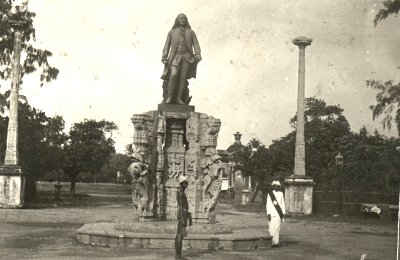Joseph-François Dupleix
(Landrecies 1697 - Paris 1763)
* French Governor in India *

This may sound very surprising for most
Landrecians, but Joseph-François Dupleix only resided in Landrecies for a
very short time. His parents
actually came from central France, and their stay in our town was purely
professional and temporary. Dupleix was born on Aerschot Street on January 1st
1697, and he spent only the very first year of his life in Landrecies, before
leaving with his parents for Brittany. Nevertheless, Landrecies does care about
being the birthplace of this key figure in French history.

After having spent his childhood in Brittany,
Dupleix enrolled in the French Company of India : this organization had been
founded in 1719, and its role was to look after the trade between France and its
colonies, especially French trading posts in India like Chandernagor. Dupleix
quickly went up through the ranks of the Company, and he became the governor of
Chandernagor in 1731. He achieved his greatest success when he was finally
chosen as the new General Governor of the Company in 1742.

But 1742 was also the peak of
King George's war : broadly speaking, this war mainly opposed France and
England, and that's why French and English trading posts in India began to fight
each other. French colonial troops in India were entrusted to Dupleix, and under
his command they achieved remarkable victories. In 1746 Dupleix seized Madras,
an English trading post. In 1748, he successfully prevented English forces from
besieging Pondichéry, an important French post.

Unfortunately the situation in
Europe was not so good for the French government, which had to sign a peace
treaty with England. According to this agreement, France didn't lose anything in
Europe but had to give up all of Dupleix's conquests. Thus, all the efforts of
the governor eventually proved vain !
However Dupleix wasn't
dispirited, and he tried to make France powerful in India again through another
way. His new policy was to intervene diplomatically in the local Indian kingdoms
and to put them under French protection, without hesitating to use his own money
if France didn't give him any. In other words he created a whole set of French
protectorates in the area and ensured French domination over a large part of
India.
But once again, the dedication
of Dupleix turned out to be useless. During a new war against France the
commander of English colonial troops, Baron Robert Clive, defeated the French
protectorates several times.

In Paris, the Board of directors
of the Company grew increasingly dissatisfied with Dupleix's policy, which was
deemed too bold and dangerous. As a consequence he was called back to France in
1754. This was a terrible disfavour for this man who had devoted his entire life
to French interests in India. Dupleix spent the end of his life away from
society, secluded himself in his apartments in Paris and never traveled again.

The Seven Years War ended very
badly for France, with the humiliating Treaty of Paris in 1763. France lost most
of its colonial empire throughout the world and only kept five trading posts in
India. Dupleix couldn't stand such a situation, and he died a few months later,
on November 13th. All the money he had invested in India was never paid back to
his family.
Next :
Henri Clarke (1765 - 1818)




